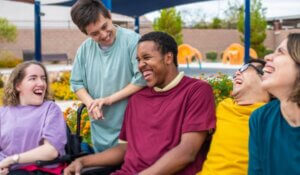
Improving the health and well-being of people with disabilities is necessary to reach the Sustainable Development Goals (SDGs). Everyone’s health and well-being depends on having a good standard of living, fair wages, and involvement in education and community activities. These are all covered by the SDGs, but individuals with disabilities often face more challenges in these areas.
The 2030 Agenda for Sustainable Development and its 17 goals create a strong plan to help local communities, countries, and the world work towards development that includes people with disabilities. It promises not to leave anyone behind and considers disability an important factor to consider in achieving all its goals.
What is meant by disability?
The United Nations’ 2007 Convention on the Rights of Persons with Disabilities (CRPD) calls disability an “evolving concept.” It explains that people with disabilities are those who have long-term physical, mental, intellectual, or sensory challenges. These challenges, combined with different barriers, can prevent them from fully participating in society like others.
Disability varies in severity, as mental and physical limitations can be minor or severe. Throughout life, everyone encounters some form of disability because, at some point, everyone experiences limitations in how their body or mind works. Some people have serious challenges with senses, movement, communication, or thinking, like those who are blind, deaf, use wheelchairs, or children with learning disabilities. Others have milder issues that need attention to prevent them from getting worse. As people get older, they might face multiple mild or moderate problems that add up to higher levels of disability.
What are some examples of disabilities?

- Single gene disorders, like Duchenne muscular dystrophy
- Chromosome disorders, like Down syndrome
- The mother being exposed to infections or substances, such as rubella or alcohol, during pregnancy
Disabilities can also show up in childhood as developmental conditions, like autism or ADHD. They can result from injuries, like brain or spinal cord injuries. Some are due to long-term conditions, like diabetes, leading to issues like vision loss or nerve damage. Disabilities may be progressive, like muscular dystrophy; static, like limb loss; or intermittent, like certain types of multiple sclerosis.
What is abelism?
Abelism has been a bit of a buzzword online as of late, and while many have heard the term, it can be tricky to understand what it means.
Ableism refers to the unfair treatment and discrimination against people with disabilities. Like other forms of prejudice, it has deep roots in society. This isn’t just a new topic; for a long time, people with physical and mental health issues have been unfairly seen as inferior and given lower social status. Recently, the idea of ableism has gained more attention. More people are recognizing and speaking out against ableist language, beliefs, and attitudes, encouraging others to challenge and avoid them.
Ableism can involve various actions, words, and ideas, some of which might not appear obviously harmful or mean. This is why it can sometimes be hard to identify.
Ableism often starts when people don’t recognize the various disabilities others might have. It involves thinking individuals with disabilities are less important or wishing they could be “fixed.” It includes calling them “inspirational” just for doing normal things, assuming their lives are sad or limited, and thinking they can’t do things by themselves.
It also happens when people use words like “normal” to describe those without disabilities, ask personal questions about disabilities, touch people or their equipment without asking, ignore requests for help, or refuse to use the names people prefer, like “a person with a disability” rather than “a disabled person.”
Abelism’s Impact on Everyday Life for Persons With Disabilities
Abelism is an important discussion when it comes to the theme of this year’s International Day of Persons with Disabilities, as individuals with disabilities are often overlooked for leadership roles. Everyone should have equal opportunities and respect, but ableism takes these away from people with disabilities. It can limit their lives, sometimes even more than the disability does.
Ableism may lead to fewer job opportunities or lower incomes and make everyday activities challenging due to lack of accommodations. Over time, people facing ableism might start to believe negative messages and limitations about themselves. For example, someone who is always treated as helpless might stop trying to do things on their own.
Over time, not being acknowledged or accepted can lead to feelings of loneliness and isolation. This might also cause ongoing stress, anxiety, and feelings of depression and hopelessness.
How Can We Reduce Abelism?
Wondering if a question or comment might be ableist? Think about these:
- When asking a question or making a comment to an individual with a disability, first consider if the same question would be asked to someone without a disability. If the answer is no, maybe avoid the question!
- Is the focus on the person’s disability instead of who they are?
- Are they speaking for the person, guessing their needs, or choosing for them without asking?
- Do they really need to know this information?
- Are they expecting the person to teach them about their disability or disabilities in general?
- Words can have a big impact. To help avoid ableism, people should learn about the terms that promote it and stop using them. Such as the word “crazy”. Even if everyone says them or they don’t mean them in a hurtful way, the impact can still be negative.
How can I get involved in IDPWD?
There are several ways to participate in the International Day of Persons with Disabilities. People can host or attend events around December 3. They can start conversations in their communities to raise awareness and support for people with disabilities. Reading, watching, or listening to stories from individuals with disabilities can help change attitudes and beliefs. Taking action to remove barriers and improve accessibility is also important. Sharing supportive messages online helps spread the word about the day. Check this link for resources for schools, community groups, or workplaces to find events for the day.
What is an invisible disability?
Invisible disabilities are disabilities that may not be obviously seen when one looks at a person. They include things like severe pain, tiredness, dizziness, and difficulties with thinking, learning, or mental health. They can also involve hearing and vision problems. These issues aren’t always obvious to others but can limit daily activities from mild to severe and vary from person to person.
Is ADHD a disability?
Yes, ADHD is covered by the Americans with Disabilities Act (ADA). Whether you see ADHD as something that affects how the brain focuses or as a disability that affects work, the ADA includes people with ADHD.
Is being disabled permanent?
Disabilities can be temporary or lifelong. If you have a lifelong disability, you might qualify for benefits. This depends on the cause of your disability and how it affects your ability to work.
















